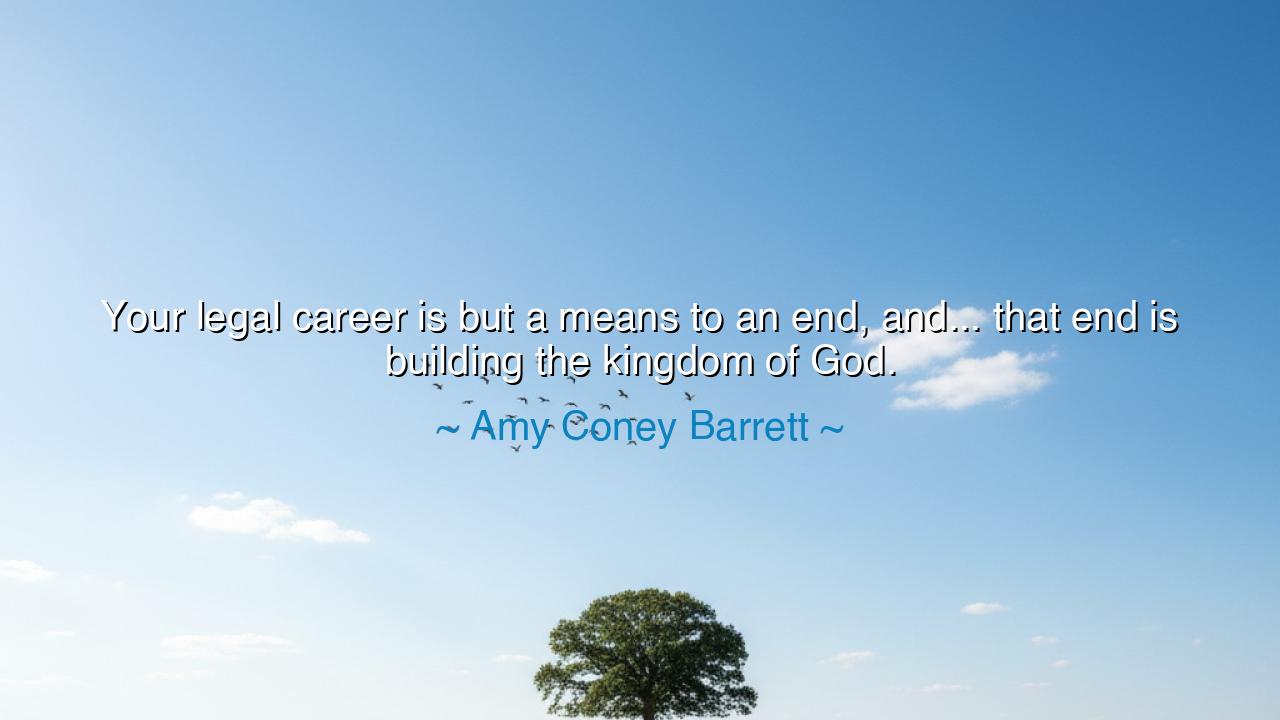
Your legal career is but a means to an end, and... that end is
Your legal career is but a means to an end, and... that end is building the kingdom of God.






Hear the solemn words of Amy Coney Barrett, spoken with gravity and faith: “Your legal career is but a means to an end, and… that end is building the kingdom of God.” At first, these words may strike the ear as strange, for many imagine their careers as the summit of their purpose, the measure of their worth. Yet Barrett turns that belief on its head, reminding us that professions, honors, and worldly achievements are not ends in themselves, but tools, instruments forged for a higher calling. The career is the path, not the destination. The true destination is eternal—the work of justice, mercy, and truth, which together form the pillars of the kingdom of God.
The ancients knew this lesson well. They told of warriors who thought their sword was meant only for conquest, until they learned it was meant to guard the innocent. They told of philosophers who first sought wisdom for pride, but later gave it freely to uplift their cities. So too Barrett teaches: the law is not simply for the accumulation of power, wealth, or recognition; it is a sacred instrument, meant to defend the weak, uphold justice, and reflect the divine order. To mistake the means for the end is to live shallowly; to see the end beyond the means is to live nobly.
Consider the example of William Wilberforce, who used his political and legal career in Britain not to enrich himself, but to wage a lifelong struggle against the slave trade. Many mocked him, some opposed him fiercely, yet he endured. For him, politics was but the means; the true end was to serve a cause greater than himself—to restore dignity to the oppressed and to honor the God who made all men equal. By dedicating his profession to the higher good, Wilberforce became a servant not just of his nation, but of heaven’s justice. His story breathes life into Barrett’s teaching: that a career must be directed toward something eternal, lest it wither into vanity.
Barrett speaks especially to those in the legal profession, for the law is a mighty tool. It can be used to liberate or to enslave, to preserve justice or to shroud oppression in the guise of legality. She warns that if the law becomes an end in itself—mere cleverness, prestige, or a ladder to power—it will betray its purpose. But if law is harnessed as a servant of the higher good, it becomes radiant, a reflection of divine justice upon the earth. In this way, every argument, every ruling, every act of advocacy may become a stone in the building of the kingdom of God.
The lesson reaches beyond the law and into all professions. Whether one wields a plow, a pen, or a gavel, all labor may become sacred when directed toward truth, justice, and love. A farmer feeds the hungry, a teacher shapes the young, a healer mends the broken—each may see their craft not as the end, but as the means to serve a higher calling. This is the wisdom that transforms ordinary toil into eternal purpose.
Yet Barrett’s words also carry a challenge: the higher end demands sacrifice. To live for the kingdom of God is to place service above self, principle above ambition, and eternal truth above fleeting applause. This path may bring opposition, misunderstanding, even suffering. But it is the path that gives life meaning beyond measure, for it ties the brief span of one’s career to the boundless work of eternity.
Therefore, beloved listener, take this lesson into your heart: whatever your craft, your study, your profession, do not mistake it for the final prize. Ask always: “To what greater end do I labor? Whose cause does this serve? What eternal truth does this advance?” For if your career is bound only to yourself, it will fade like smoke; but if it is bound to justice, mercy, and the kingdom of God, it will shine with a light that endures beyond generations.
Thus Amy Coney Barrett’s words stand as both warning and inspiration: your career is the path, but the end is divine. Walk it not for self alone, but for truth everlasting. In this way, your labor will become more than work; it will become a legacy, a stone set into the eternal temple of God’s justice on earth.






AAdministratorAdministrator
Welcome, honored guests. Please leave a comment, we will respond soon